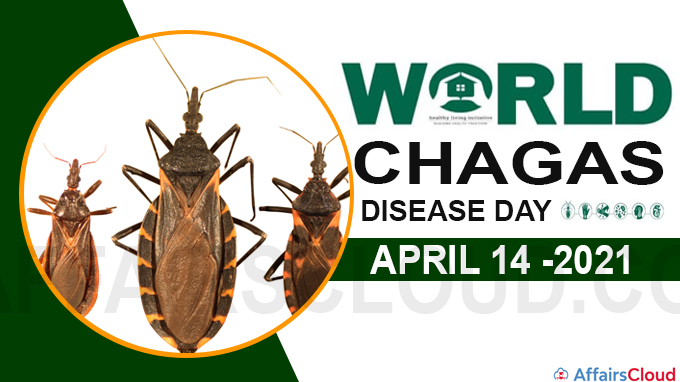 The World Chagas Disease Day is annually observed across the globe on 14th April to raise awareness about Chagas disease, a life-threatening illness caused by the protozoan parasite Trypanosoma cruzi (T. cruzi).
The World Chagas Disease Day is annually observed across the globe on 14th April to raise awareness about Chagas disease, a life-threatening illness caused by the protozoan parasite Trypanosoma cruzi (T. cruzi).
Background:
i.In May 2019 the 14th April of every year was established as the World Chagas Disease Day upon the decision of the 72nd World Health Assembly.
ii.The first World Chagas Disease Day was observed on 14th April 2020.
Why 14th April?
14th April marks the day on which Carlos Ribeiro Justiniano Chagas, a Brazilian physician and researcher diagnosed the first human case of the disease, a 2-year-old girl called Berenice Soares de Moura, in 1909.
Chagas disease:
i.The Chagas disease is also known as American Trypanosomiasis.
ii.The disease is named after Carlos Ribeiro Justiniano Chagas, who discovered the disease in 1909.
iii.The disease is endemic to the areas of 21 continental Latin American countries.
iv.The disease is transmitted to humans through contact with faeces or urine of triatomine bugs (vector-borne), known as ‘kissing bugs’.
Symptoms:
During the chronic phase of the disease, around 30% of the patients suffer cardiac disorders and 10% experience digestive, neurological or mixed disorders.
Transmission:
i.Through blood or blood product transfusion
ii.Congenital transmission
iii.Organ transplantation
Treatment:
The chagas disease can be treated with 2 antiparasitic medicines
- Benznidazole
- Nifurtimox
Additional facts:
i.It is estimated that around 6 to 7 million people across the globe are infected with T.cruzi, with 10000 deaths.
ii.The disease was increasingly detected in the United States of America and Canada and in many European and Western Pacific countries.
iii.Without proper treatment, the disease can lead to severe cardiac and digestive alterations and become fatal.




